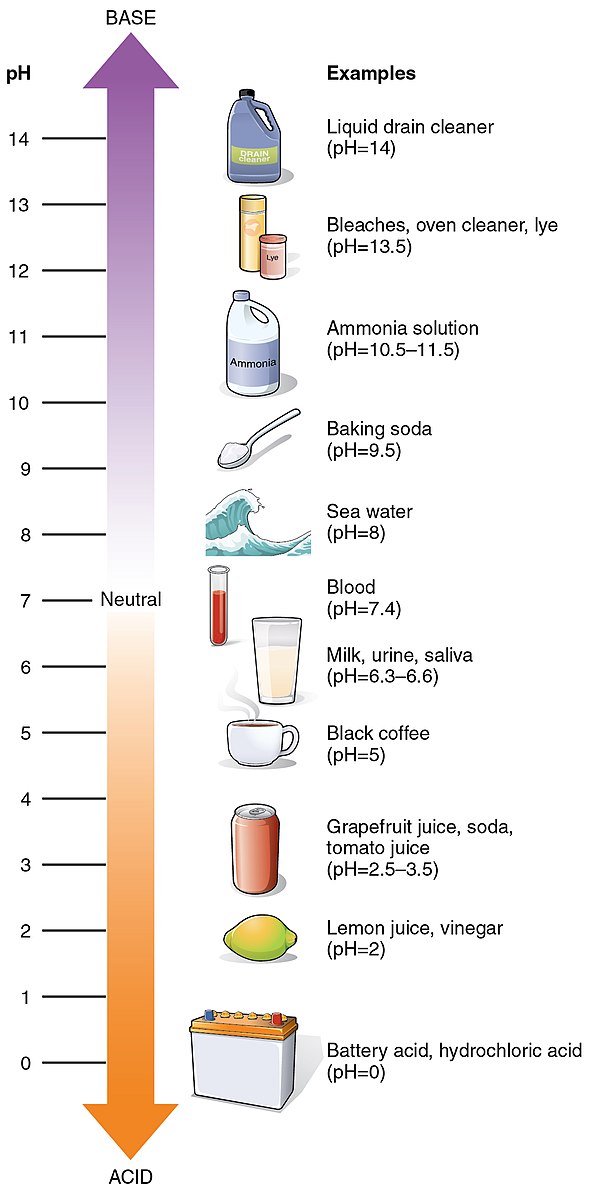The pH value of a Potassium Iodide (KI) solution in water is typically around 7.0, which is considered neutral. This is because KI is a salt resulting from the neutralization of a strong base (KOH) and a strong acid (HI). When strong acids and strong bases react, they form a salt and water, leaving no excess hydrogen or hydroxide ions in the solution, resulting in a neutral pH.
Factors Affecting the pH of KI in Water
The pH of a KI solution in water can be influenced by several factors:
- Temperature: The pH of the solution can vary slightly with changes in temperature.
- Concentration: The pH may be affected by the concentration of the KI solution.
- Presence of Other Ions: The common ion effect can occur when a strong electrolyte with an ion in common with the solution is added, which can affect the pH.
Dissociation of KI in Water
 Image source: OpenStax College
Image source: OpenStax College
When KI is dissolved in water, it dissociates into potassium (K+) and iodide (I-) ions. This dissociation does not change the pH of the solution because the K+ and I- ions do not react with water to form acids or bases.
Balancing the pH of KI in Water
To balance the pH of a KI solution, you can add acid or base to the solution to adjust the concentration of hydrogen or hydroxide ions. For example:
- If the pH is too high, you can add a small amount of a strong acid like hydrochloric acid (HCl) to lower the pH.
- If the pH is too low, you can add a small amount of a strong base like sodium hydroxide (NaOH) to raise the pH.
Importance of Using Pure Water
When preparing a KI solution, it’s essential to ensure that the water used is free from impurities that could affect the pH or the stability of the solution. For instance, dissolved carbon dioxide (CO2) in the water can react with the hydroxide ions (OH-) to form carbonic acid (H2CO3), which can lower the pH of the solution. Therefore, it’s recommended to use deionized or distilled water to prepare the KI solution.
Applications of KI Solutions with Neutral pH
Potassium Iodide (KI) solutions with a neutral pH have various applications, including:
- Medical Applications: KI solutions are used in the treatment of certain medical conditions, such as thyroid disorders and radiation exposure.
- Water Treatment: KI solutions can be used in water treatment processes to remove iodine-containing contaminants.
- Analytical Chemistry: Neutral KI solutions are used in various analytical techniques, such as titrations and colorimetric analyses.
Conclusion
In summary, the pH of a Potassium Iodide (KI) solution in water is typically neutral, with a value around 7.0. This is due to the neutralization reaction that occurs when a strong base (KOH) and a strong acid (HI) form the salt KI. The pH of the solution can be influenced by factors such as temperature, concentration, and the presence of other ions. To maintain the neutral pH, it’s essential to use pure water when preparing the KI solution and to adjust the pH if necessary by adding small amounts of acid or base.
References:
– IT&W Reagents – pH 7.0 Volumetric Solution
– Physics Forums – Common Ion Effect pH of LiF, KI, NH4Cl Solutions
– YouTube – pH of Salt Solutions
– YouTube – Common Ion Effect and pH
– Homework Study – When KI is Dissolved in Water
